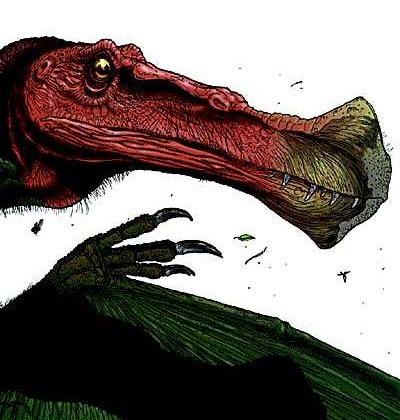OK, this is going to be a broad list of
possible 'angles' you could use when searching scientific material
on the web. Among other aims, we intend to find which Authors, texts and even languages
and specific universities are the
"top of the tip" for... let's say... "dinosauria-related" sciences.
We don't want "second hand" or "second tier" knowledge, since we are searchers, and we
"own" the web (being able to grab her most intimate
parts :-),
we might as well go for the absolute best.
Let's first of all just check how the
searchscape looks like using google and
wikipedia.
As you can easily see from this english wikipedia entrance (but it would be foolish not
to quickly check at least its DE
and FR counterparts), the most interesting parts
for us, because we are trying to establish a foothold quickly,
are the modern definition
(where, should we have forgot, we are informed that paleontologists
study such matters and that taxonomy discussions are bound to be peppered around) and the
Notes and references part, that
we will use to try to gather a useful bibliography.
The 'creationist' crap
Unfortunately some searches are bound to be politically sensitive, and the "Dinosauria" search
is one of these.
A quick glance at that very Notes and references part
will show that we have already encountered
a problem that we will meet again and again:
the crap "creationist discussion", a religious-oriented backward fight going on in the States,
that is of no scientific interest whatsoever and that
we will consider
just useless background noise, and from now on nuke from our desired results.
So a dinosaur -creationist -creationism
parameter will later come handy in all our queries.
Incidentally, while for other search-targets it is usually very useful to
visit and comb any messageboard focused on the topic you are researching,
this 'creationist' crap unfortunately means that searchers should stear clear
of all "paleontology" messageboards, since they will be infested by trolls and shills.
|
I will use in this paper google, yahoo and -occasionally- altavista and A9: be aware of the
huge differences among the various main search engines: google is globally
the most effective,
but its indexes are often quite stale, yahoo has the biggest (and freshest) index, but it is heavily
dependent from .com sites, altavista is much too easily spammed... and so on.
Well, of course
when starting with ole google a parameter like
dinosaur -creationist -creationism is not enough, given the arrogance of the
commercial invaders of our web, therefore our searchstrings need a little more cleaning
just to start with: dinosaur -buy -youtube -homepage -shop -creationist -creationism
-film -quiz -Bar-B-Que -download, or maybe we should try a completely different approach:
dinosaur site:edu.
As you can see, if you tried the queries I listed, we are already fishing in cleaner waters.
We were pointing out the "Notes and references" part of the main 'entry' to our target on wikipedia. When
searching, however, we have to keep in mind that many gems often "lurk better" in the dark web
when using specific searchterms: on wikipedia for instance the same "Notes and references"
list for
Allosaurus ("strange lizard" because
"distinguished from any known Dinosaurs by the vertebrae, which are peculiarly modified to ensure lightness":
aka "the wolf of
the late Jurassic")
could represent a valid starting point for our query. The interesting fact (which represents at the same time
an important caveat for all wikipedia users!) is that the references for our specific genus "Allosaurus"
are on wikipedia much less
exhaustive than
those we found for
its own
suborder
Theropoda.
Clearly an Allosauri-afecionado has invested a lot of time
in this entry.
Time to change perspective and start our search from a DIRECTORY, not from a search engine.
Of course we'll start with DMOZ.
Let's dig: Dinosaurs...
no much here, a quick glance at the results show it, we'll leave dmoz this time.
Let's try some nice web-combing. I want to gather quickly the names (and web-addresses) of
the most important journals, since I'll need them to assess the value of the Authorities, universities and
books we have to find. A search for paleontology journals,
or even better, vertebrate
paleontology journals, should cut the mustard quickly, and indeed it does: a bunch of first
results
have been collected here. Note that this
long list of 'paleontological' journals should
be further used as a "springboard" in order to quickly gather further angles and be able to
finetune your specific queries. An example is using three 'promising' titles in order to gather
savvy sites: +journals
"Cretaceous Research" Paleobiology "Revue de Paleobiologie" should help us to find further lists of journals,
if needed, whereas "Dinosaur Paleontology"
"vertebrate paleontology" should quickly give us also non-journal links. Note how the searchscape
changes if we add to this query "The Society of Vertebrate Paleontology":
"The Society of Vertebrate Paleontology" "Dinosaur Paleontology" "vertebrate paleontology".
I have decided to call
this well-known trick: using elements of your previous query to broaden the next query, the accumulative
law of websearching, since afaik there's no precise terminology for it.
Let's shift focus again. The point here is to use our "dinosaur*" example
to show how you can quickly but effectively search the web for scholar material, bypassing all the
commercial guet-apens we could encounter on the road.
So use your fantasy when poking the web...
...you get the idea.
Now you should be able to carry on on your own... but there's still one point that needs to be addressed:
collation.
COLLATION
Wikipedia is quite imprecise about collation, and defines it
as "the assembly of written information into a standard order". This is not true. Collation is the assembling
of all the information you have found (not necessarily "written": why? Just because historically
only texts have been collated?) integrating such information in a coherent presentation
in order to offer the best possible result. This means among other things:
eliminating doubles, choosing the best sources, choosing among variants, and so on.
TAKING NOTES & SAVING SESSIONS
Since you will need to "collate" all the material you will gather, how should you "prepare" it?
There are two easy main options: saving sessions and taking notes.
If you are using the browser Opera
(considered the quickest among the graphical browser and usually preferred by searchers),
you can save the snippets of interest you find into a track of "bread crumbs" using its
Notes function. You highlight a target text found on a webpage,
then right click on it and chose the "save to note"
option (or press CTRL+SHIFT+C, like the copy command, but with an extra "shift"). To see all your notes just press
CTRL+ALT+E (or click "tools" and then "notes"). The webpage you took the note from is automatically
stored, together with the note. Hover over the note in order to see the URL or just double click on the
note and reopen it (double clicking a note takes you back to where you got the note from).
Do not forget that you can edit those notes!
Clicking anywhere into the text of a note (on the right side), you can write and delete text,
copy it to the clipboard, or insert it from there (works just like a text editor).
You can also start an empty note (CTRL+ALT+E and then click on "new note")
and write in it whatever you fancy.
This makes Notes a great tool for preparing an excerpt from a webpage.
When, for example, the information you need is "hidden" in a lengthy piece of prose,
the Note function can be used to jot down just a few headwords as you read.
That way you don't have to re-read the entire document if you need it again, and you
can later use the snippets you highlighted in your wordprocessor.
This makes Notes a very useful function for students!
(Notes are great for saving forum posts, draft submissions, login details and eReceipts).
Finally do learn how to create FOLDERS inside your notes, and then just shift the new notes inside
the appropriate folder. When preparing this paper I had just four folders:
"journals", "tips", "universities" and "alltherest", and collation was easy afterwards.
You can also (and you should) save your global search session, freezing a given
moment of your search activity in time. I usually name sessions with the current date and time,
something like "110208_1500", but you could name the session you have started following this paper -say-
"dinosaurs".
Get used to save your sessions when searching, it will be a life saver later, when collating results.
|


